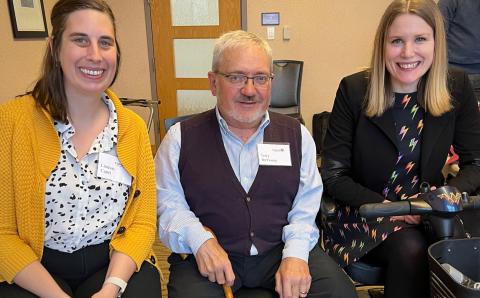Classis Grand Rapids East, a regional group of congregations of the Christian Reformed Church that has been working with a committee of synod related to decisions of Synod 2022 last June, discussed that committee’s report at its January meeting. Minutes for the meeting note that classis “receives the work and the report of the committee with gratitude and in particular acknowledges the admonition in the report” and also that Grand Rapids East “will wait for the adjudication of Neland (Avenue CRC)’s appeal by Synod 2023 before discerning any further action to take about Neland.”
A classis is a regional group of churches within the CRC and is one assembly broader than the local church council. Synod is the broadest assembly of the CRC, the annual gathering of delegates from each of the 49 classes. At the 2022 synod, delegates voted to instruct Neland Avenue CRC, a congregation within Grand Rapids East, to remove from office a deacon it had appointed in 2020. The deacon is a woman who is married to a woman. Officebearers are meant to uphold and live by the confessions and teachings of the church. Since 1973 the CRC’s position on homosexuality has been that homosexual sex, though not the orientation, is incompatible with God’s will as revealed in Scripture. The category of that synodical report is pastoral advice. Synod 2022 upheld that teaching and formally interpreted “unchastity” in the Heidelberg Catechism Q&A 108 to include homosexual sex as well as a list of other extra-heterosexual marriage activities. Synod declared this definition an interpretation of a confession, and adopted that “therefore this interpretation has confessional status” (Acts of Synod 2022, p. 922). That action has generated questions from members, councils, and classes about what status those who disagree with synod’s interpretation now have in the denomination.
Neland has not deposed its deacon and intends to appeal the decision of synod. Grand Rapids East, at its Jan. 19 meeting, decided “Classis GRE will wait for the adjudication of Neland’s appeal by Synod 2023 before discerning any further action to take about Neland. This is consistent with both accountability and due process for Neland under the Church Order and prior decisions of Synod.” Disagreeing with the report of synod’s in loco committee, Grand Rapids East says in its communication to synod, “The Report of the in loco committee did not show that Classis GRE must respond again about Neland before Synod 2023 hears Neland’s appeal.” It suggests the committee “read more into” statements “of affirmation and gratitude towards Neland” from Classis GRE “than was intended.” The communication says “Classis has responded sincerely and faithfully about Neland” all along, from correspondence with the Council of Delegates (the interim committee of synod), formal communications with synod, and participation with the in loco committee. Grand Rapids East’s communication also cites from the Acts of Synod 2015 (p. 674), noting “Synod cannot instruct a classis or a council to exercise discipline, except upon appeal (one consistory cannot ask another consistory to act as its proxy in matters of discipline, as indicated in decisions of Synod 1988, Acts of Synod 1988, p. 613). The discipline of church members is the responsibility of the local council (see Church Order Articles 37, 78-81, 85).” The communication says, “The Church Order contains no provision for a classis to intervene to prevent a local church from appealing its discipline by Synod.”
In loco committee’s report
The report of the committee appointed by Synod 2022 to oversee Neland Avenue CRC’s compliance to synod’s rulings was included in the agenda for the Jan. 19 meeting of Classis Grand Rapids East. It will be included in the Agenda for Synod 2023.
The committee reports that in its work since August 2022, “We have always been together as brothers and sisters in Christ.” And “In all of our meetings we have been greeted with Christ-like love and an openness to our presence and communication. There have been times of disappointment, frustration, and perhaps even anger, but these emotions have always been mutually expressed and received in the bonds of Christian fellowship.”
Recognizing that both Neland Avenue CRC and Classis Grand Rapids East and various synods and their study committees have “carefully deliberated, studied, and pastorally cared for one another as they have discussed LGBTQ+ issues through the years” but have reached different conclusions, the committee states,“The issue here is how do we keep covenant with one another when there is sharp disagreement.” The committee was faithful to its mandate from synod. “We have not been authorized to negotiate or in some way to mitigate the decisions of Synod,” the report says. “While it is true that, to date, no one from Neland Avenue CRC has appealed its decision to ordain a same-sex married person as a deacon to classis (or synod), Classis Grand Rapids East has a responsibility to promote accountability to our synodical and confessional decisions on this and all other matters as part of our shared covenant as congregations, classes, and as a denomination,” the report says. “We admonish Classis Grand Rapids East for failing to hold Neland Ave CRC accountable to the larger body, and for failing to adhere to our shared covenants and procedures in how to bring change within the CRCNA.”
The report recommended that Classis Grand Rapids East “establish an oversight committee to guide the Neland Avenue congregation and leadership into alignment with the Biblical guidelines affirmed by Synod 2022 regarding same sex sexual relationships.” Grand Rapids East is not acting on that recommendation.
Seeking change from ‘confessional status’ to ‘reasonable interpretation’
At the Jan. 19 meeting Classis Grand Rapids East also adopted an overture (formal request to synod) “to declare that Synod 2022's interpretation of ‘unchastity’ in Heidelberg Catechism Q&A 108 does not have confessional status but that instead this can function as a reasonable interpretation of ‘unchastity’ to provide guidance for the church in dealing with these matters.” The request says, “The Forms of Unity and the historical doctrinal standards in the CRCNA communion have traditionally included three Ecumenical Creeds (Apostles’, Nicene, and Athanasian) and three Reformed Confessions (Heidelberg Catechism, Belgic Confession, Canons of Dort). Across these three Creeds and three Confessions is a rich array of ecumenical and Reformed orthodox theology from which the church teaches and preaches and to which members and office bearers give their assent. The aim of these Creeds and Confessions is to unite the church around a common theology. But the confusion surrounding the interpretation of the single word ‘unchastity’ in just one of these documents has seemed to make that one word, its interpretation, and its application stand alone as the primary mark of confessional orthodoxy in all matters regardless of one’s commitment to everything else in the Creeds and Confessions. Such confusion could be cleared up by designating this as a reasonable interpretation to be used as guidance for the churches.”
Any individual can send a communication to synod, provided they follow synod’s rules for procedure, including having their communication first adjudicated by their church council and then the council’s classis. A communication does not have to be acceded to by either assembly; the individual may direct the communication on their own once it has been heard in both assemblies.
About the Author
Alissa Vernon is the news editor for The Banner.









